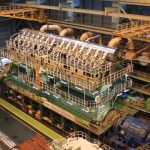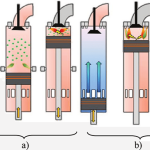An engine has valves that let the air-fuel mixture into the combustion chamber to be burned and then draw out the exhaust gas after the combustion. A conventional engine has one intake valve to let in the air-fuel mixture and one exhaust valve to let out the exhaust gases. But the 4-valve engine has two intake and two exhaust valves. Just like having two doors lets more people enter and leave a room in a given amount of time than one door and more exits make for a more efficient flow of people, four valves is better than two. Four valves give an engine steadier low-speed performance and a better acceleration feeling. That’s why most race engines and high-performance engines have four valves. For example, Yamaha’s YZR-M1 MotoGP race machine has four valves.
The 4-valve combustion chamber of the kind adopted in this engine has two intake and two exhaust valves. The first merit of this design is that it allows the spark plug to be positioned in the center of the combustion chamber to provide more efficient flame spread and combustion. In other words, it enables highly efficient combustion.
Also, the 4-valve design enables greater overall valve area than a 2-valve system for more efficient (per unit of area) intake and exhaust function. This is the second major merit.
The combustion chamber of the YZF-R15 engine is a hemispherical 4-valve type and its shape is designed with the minimum area necessary for the two intake and two exhaust valves. At the same time it is designed with a minimum intake and exhaust valve angles to realize an optimum combustion chamber shape. As an important factor determining combustion efficiency, the surface area/volume ratio (S/V ratio) has been minimized as well.
This combines with the effects of the fuel injection system to produce outstanding engine performance characteristics and contributes to more enjoyable running performance in long-distance riding in the suburban areas and running in the mid- to high-speed range.



